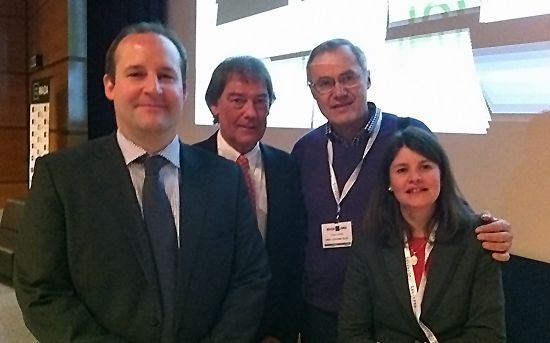FISU at the WADA Symposium

The 9th edition of the WADA symposium held from 19 to 20 March, 2013 in Lausanne ended with tremendous success. Leading the two-day event, WADA European Office & International Federation Relations, Frédéric Donzé, was pleased to inform that the Symposium was recording an increased participation each year, reaching 330 in 2013. Attracting representatives from various organisations from all over the world (ISFs, NADOs, RADOs, Major Games Organisers, service providers, etc.), it offers a very useful platform for networking and exchanging ideas on how to improve collaboration in the fight to deter doping in sports and provide a clean-sport environment for our athletes. FISU was represented by its Medical Committee Vice-Chair, Dr. Dusan Hamar, and General Office Manager, Caroline Feyaerts.

Opening addresses were made by Swiss authorities, Mr. Philippe Leuba, State Councillor and Head of the Department for Economy and Sport, and Mr. Marc Vuillemier, Municipal Councillor in charge of Public Security and Sports, who both officially and warmly welcomed the participants to Lausanne.
An important item on the agenda was the review process of the 2015 World Anti-Doping Code. WADA thanked for the many comments and feedback received during the consultation phases. The revised World Anti-Doping Code will be presented for approval at the 2013 World Conference on Sport organised from November 12 to 15 in Johannesburg (RSA). Further to the conference, FISU as well as other ISFs, NADOs, RADOs, etc. will have to incorporate the revisions in their own anti-doping regulations to comply with the revised Code, which will become effective on January 1st, 2015. Other items on the agenda included the review of the standards for Testing and Therapeutic Use Exemptions, the potential to move towards more intelligence gathering and investigations, and the use of the Athletes’ Biological Passport (ABP).
WADA’s Director General, David Howman, highlighted the major achievements made in anti-doping from the time of adoption of the WADA code in 2003 until today. He also spoke about the challenges remaining for the future and presented WADA’s priorities for 2013: the final stage of the Code reviewing process, the preparation of the 2013 World Conference on doping in Sport, the increase in the capacity of RADOs, further advance to be made in ADAMS and in the Athletes’ Biological Passport (ABP).
The new format of the symposium made it very interactive not only with many Q&A sessions, but with break-out sessions leaving space for discussion on proposed articles of the revised Code (sample analysis and prohibited association), proposed articles on the review of the IST and ISTUE standards (athlete definition, TUE recognition and whereabouts) as well as on a non-analytical case study. A roundtable on the development of intelligence investigations and functions also took place with speakers and moderators. The Symposium went on with three parallel sessions on the implementation and development of ABP Steroid Module, ABP Blood Module and a training session for less experienced ADO personnel.

A moment which all will certainly remember was the testimony of a former cyclist who had recently come forward and who took the opportunity, at the Symposium, to openly explain the reasons which had pushed him to do doping during his professional career. This generated much positive feedback from the participants.
In the closing remarks, WADA underlined the importance of using the contacts made during the Symposium to improve communication and collaboration within the anti-doping community. WADA announced the dates of the next edition and hopes to meet everyone again in Lausanne on March 25th and 26th, 2014.
